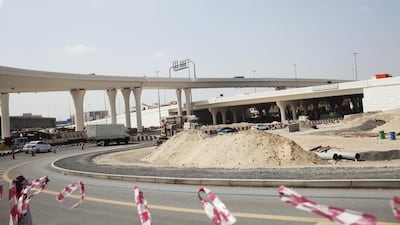Northern Emirates on the agenda: In this series
February 16: Keeping pace with change in Ajman
February 17: Lack of services holding UAQ back, residents say
February 18: Infrastructure needs to catch up with RAK's growing population
February 19: Residents conflicted over changes in Fujairah
_____________________________________________________________
SHARJAH // In an emirate renowned for Islamic culture, art festivals and traditional architecture, residents point out Sharjah is also infamous for its lengthy traffic jams.
Long tailbacks of vehicles along main roads leading in and out of the city and its suburbs have been a way of life for many years. Recent investment in roads and bridges, however, aims to improve the situation.
In research by Sharjah Police it was found that the average traffic speed in peak hours was a painfully slow 20kph.
“Al Wahda Street is 10 kilometres long. It takes an average of one hour to travel it during rush hours,” said Lt Col Obaid Saleh Hassan. “In off-peak hours it should take seven minutes.”
A Dh1 billion project to redevelop one of the main problem areas around the National Paints roundabout is near completion, with new bridges, intersections and more lanes for traffic.
“I’ve been taking Mohammed Bin Zayed Road every day for the last few years,” said Ahmed Yousef. “My commute is consuming less time than it used to. It takes me around an hour and a half to reach Al Barsha in Dubai.”
Traffic problems, however, still persist, especially during the morning rush hour and school run in the Muwailih and Aezzrh neighbourhoods.
“Can you believe that it takes me almost two hours to drop off my kids in the morning?” said Al Qasimiya resident Nora Said. “It takes me one and half hours to pick them up after school.”
To tackle the problem, the Department of Planning and Survey has added more entrance and exit roads and has banned lorries from the area between 7am and 8.30am and 1pm to 3.30pm. Sharjah Ruler Sheikh Sultan Al Qasimi has also ordered security guards in the area to facilitate traffic flow in front of the schools until the road work is completed.
In Aezzrh, the Sharjah Roads and Transport Authority has finished building new roads around school complexes at a cost of Dh4m.
Another problem being addressed is the lack of pedestrian bridges, particularly in Helwan and Al Tawon.
Khalid Al Ali, secretary general of the Urban Planning Council, said plans for several bridges were under way, including one near Al Qassimi Hospital.
With the creation of the Al Majaz waterfront delivering a huge boost to local tourism, the area is now undergoing a facelift where roads are resurfaced. A lack of parking is also being addressed with the creation of more regulated spaces.
Investment is also being made in flood prevention works, with the municipality clearing water drainage tunnels.
Marwan Al Sarkal, chief executive of Shurooq, the investment and development authority, said the emirate was opening up the healthcare, transport and logistics sectors, as well as in environment and tourism.
“The development in Sharjah has seen a dramatic advantage recently with regulations that have been set by the government.
“There are many projects announced by Shurooq and other developers all around the emirate, be it in Kalba, Khor Fakkan, Diba and the central region.”
tzriqat@thenational.ae

